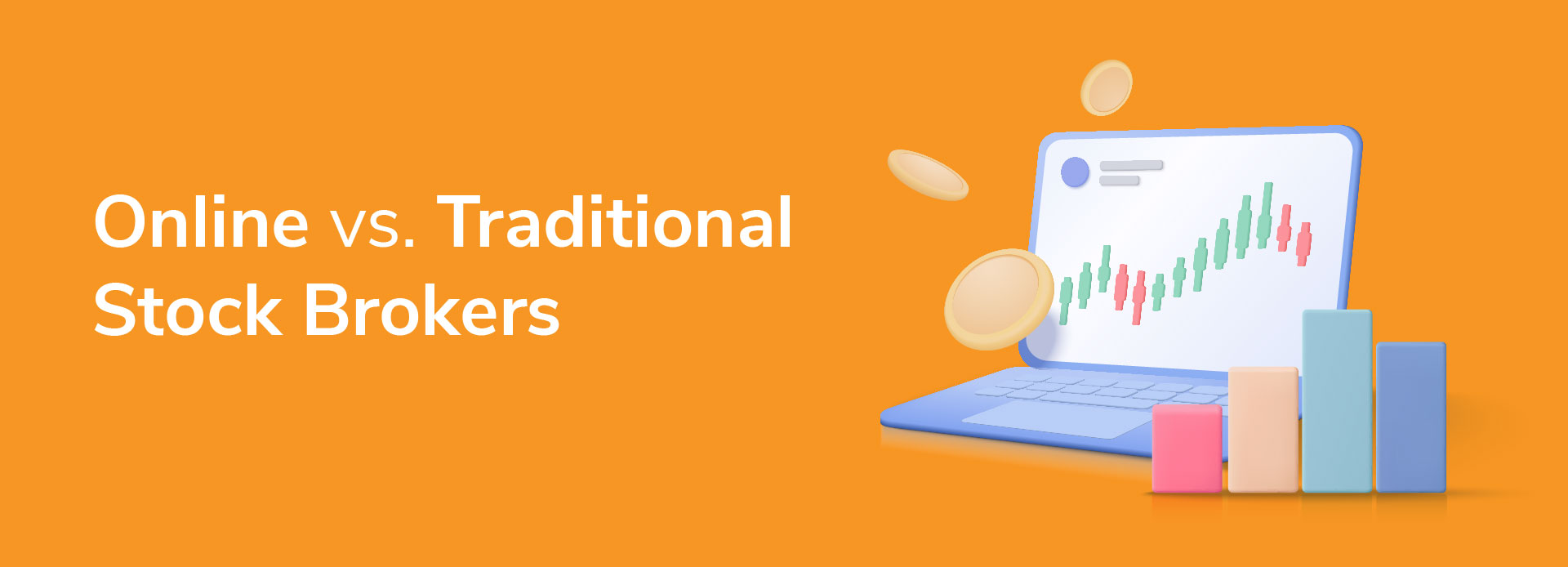
Comparing Online Vs. Traditional Stockbrokers: Pros and Cons
09 April 2024 | By INDIE
The evolution of technology has revolutionised the stock market, providing investors with two primary options for trading: online brokers vs traditional brokers. Each approach comes with its set of advantages and drawbacks, catering to different investor preferences and needs. In this article, we will explore the pros and cons of online and traditional stockbrokers to assist investors in making informed decisions based on their individual requirements.
Understanding Online Stockbrokers
An online stockbroker is a financial intermediary or platform that facilitates the buying and selling of financial schemes, primarily stocks, through the Internet. Online stockbrokers have become popular due to technological advancements, offering investors a convenient and cost-effective way to participate in the stock market. These platforms enable users to execute trades, monitor their portfolios, access market information, and conduct financial research—all through online interfaces.
Pros
Cost-Effective Trading: Online brokers often offer lower commission fees and transaction costs compared to their traditional counterparts. This cost-effectiveness is appealing to investors seeking to optimise their returns by minimising trading expenses.
Convenience and Accessibility: The hallmark of online trading is its accessibility. Investors can execute trades from the comfort of their homes using computers or mobile devices. This convenience allows for real-time monitoring and instant execution of trades.
Wealth of Information: Online platforms provide a wealth of financial information, research tools, and educational resources. Investors can access real-time market data, stock analyses, and research reports to make informed decisions.
Self-Directed Investing: Online trading empowers investors to take control of their portfolios. It caters to those who prefer a hands-on approach, allowing them to execute trades and manage investments independently.
Cons
Limited Personalised Assistance: The absence of face-to-face interaction can be a drawback for investors who value personalised assistance. Online platforms may lack the human touch and tailored advice provided by traditional brokers.
Technical Glitches and Downtime: Online platforms are susceptible to technical issues and downtime. Connectivity problems or system outages can disrupt trading activities, potentially causing inconvenience and financial losses.
Overreliance on Technology: Investors heavily reliant on technology may face challenges during system malfunctions or cyber threats. Technological dependency raises concerns about the security and stability of online trading platforms.
Understanding Traditional Stockbrokers
A traditional stockbroker, also known as a full-service broker, is a professional or brokerage firm that provides a comprehensive range of financial services to investors. Unlike online brokers who operate primarily through digital platforms, traditional stockbrokers typically offer personalised advice, tailored investment strategies, and a hands-on approach to managing clients' portfolios. These brokers are often associated with established financial institutions and have a physical presence, allowing for face-to-face interactions with clients.
Pros
Personalised Guidance: Traditional stockbrokers offer personalised advice and guidance. Investors can benefit from the expertise of a financial professional who understands their financial goals and risk tolerance.
Relationship Building: Face-to-face interactions foster relationships between investors and brokers. Trust and rapport play a significant role, and traditional brokers can provide ongoing support and tailored solutions.
Comprehensive Services: Traditional brokerage firms often offer a comprehensive suite of financial services beyond trading, including retirement planning, wealth management, and estate planning.
Cons
Higher Costs: Traditional brokers typically charge higher commission fees and service charges. The cost of personalised services may outweigh the benefits for investors seeking more cost-effective options.
Limited Accessibility: Conducting trades through traditional brokers may involve phone calls or in-person visits, limiting the immediacy and accessibility provided by online platforms. This can be a drawback for investors who value quick execution of trades.
Less Control for Investors: Traditional brokers may take a more active role in managing portfolios, reducing the level of control investors have over their investments. Some investors may prefer a more hands-on approach.
Recommended Read: Know What Is a Common Stock and Its Types.
Final Thoughts
The choice between online brokers vs traditional brokers ultimately depends on individual preferences, investment goals, and the level of involvement an investor desires. Online brokers are ideal for those seeking cost-effective, self-directed trading with easy access to information. On the other hand, traditional brokers cater to investors valuing personalised advice, comprehensive services, and long-term relationships.
It's crucial for investors to carefully evaluate their priorities, consider the pros and cons, and choose a brokerage option aligned with their financial objectives. Additionally, exploring hybrid models or platforms that offer the best of both worlds may provide a balanced approach. This allows investors to benefit from both online convenience and traditional expertise.
Explore the diverse range of stock broking investment options offered by INDIE in partnership with Paytm Money to make informed decisions.





